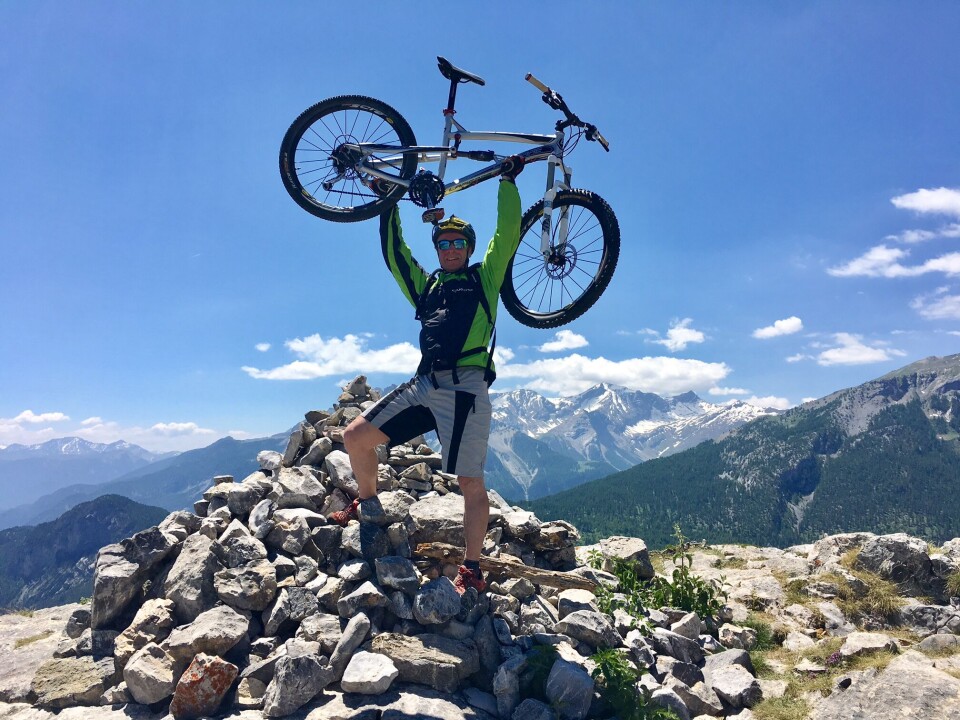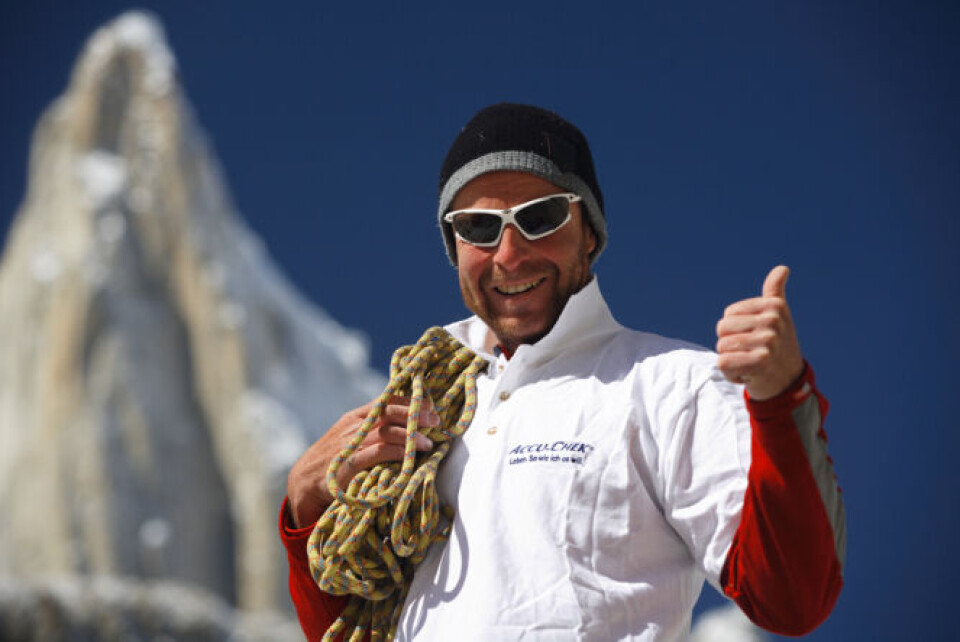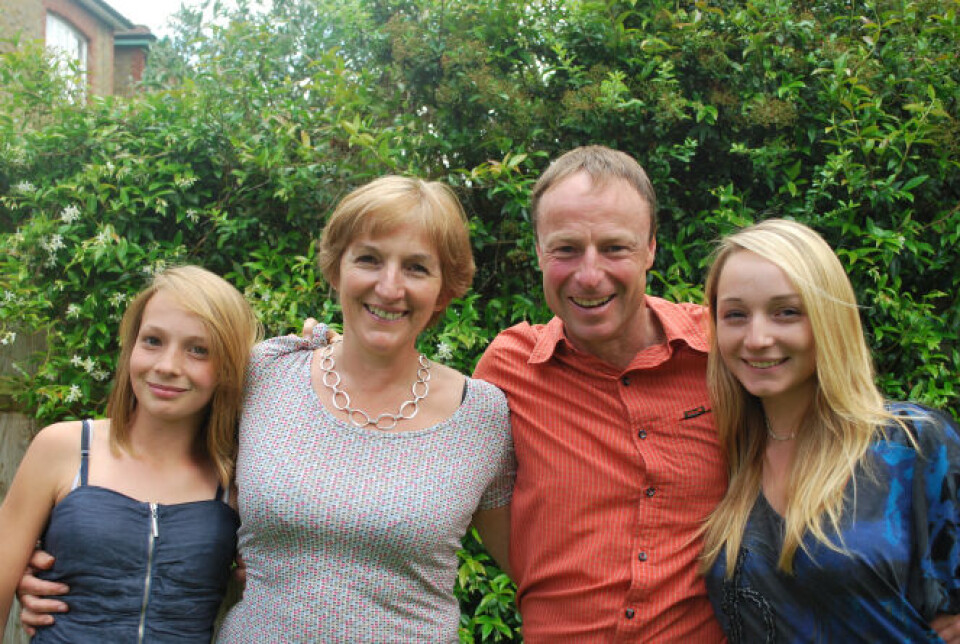-
New bill targets skiers under influence of alcohol or drugs
There are not currently any specific rules on skiing while under the influence
-
France must do more to protect citizens detained in Iran, says former hostage
French-Irish citizen Bernard Phelan tells Théophile Larcher how 221 days in an Iranian prison have changed him irrevocably
-
What snow conditions look like for skiers across French Alps and Pyrenees
Ski resorts are expected to get busier as school holidays begin this weekend
In France you are more responsible for yourself, says UK adventurer
A French resident of nearly 20 years, Jerry Gore talks about his life of adventure, climbing mountains, living with diabetes and why he loves his life in the southern Alps

At 60 years old, Jerry Gore has packed more into his life than most of us.
He has climbed many of the world’s highest and most dangerous peaks, been on expeditions with the biggest names in climbing and adventure including Sir Chris Bonington, Sir Robin Knox-Johnston and Ian Parnell, been attacked by a Himalayan brown bear and broken his neck twice.
His latest challenge has been learning to live with type 1 Diabetes, and he has co-founded a charity for children with the disease in South-East Asia.
In 2003, he moved to Vallouise in the Hautes-Alpes. There he runs holiday rentals and AlpBase Academy with outdoor adventure courses for young people and gives motivational talks.
He continues to take part in at least one extreme outdoor challenge every year:
“When I was 16 I walked across the Vatnajökull ice-cap in south-east Iceland. It was an expedition with the British Exploring Society and even back then in 1977, we were measuring glacial recession. Ever since I have taken up a challenge every year. I have always had an adventurous spirit. I joined the Royal Marines, and though I was bullied and broke my arm in training I got through it and got my Green Beret.
I wanted to make my parents’ proud and I wanted to go to the Himalayas, because I knew that the military organised expeditions now and again. When I got there I climbed a 7,000 metre peak when I was 22; that was my introduction to big mountains and I loved it.”
What kind of climbing have you done since then?
Most climbers specialise in one aspect such as rock or boulder climbing or becoming an ice climber or an expedition climber, a big wall climber, or a high altitude climber.
I like to do it all in terms of climbing, and I have effectively done that. I was probably the best big wall climber in Britain in the late 90s, I have done high altitude peaks, like the K2 this year, I have done new routes, six or 7,000 metre peaks and I have got the UK speed record for the North face of the Eiger.
How has diabetes changed your life?
I was diagnosed with diabetes 1 when I was forty, a late onset diabetes. Most people are diagnosed between five and 15 years old. Nobody understands what triggers it, but it is an auto-immune condition and I think it was caused by stress in my case. The way I explain it is that your body turns against itself and finds its weakest link, and in my case and condition it happened to be the pancreas.
What were the symptoms?
You feel very tired and you drink a lot because you are continuously thirsty, due to the high sugar levels in your blood. You pee a lot, and you get fungal infections because you are peeing out high concentrations of sugar in your urine.
It also affected my eyesight, because it attacks your retina.
Without insulin for support, basically you can die within around six months. Type 1 is different from type 2 diabetes because it is irreversible. Your pancreas is dead, so you have to inject artificial insulin for the rest of your life. 90% of all the 550 million people in the world with diabetes are type 2.
How does that affect your daily lifestyle?
I need around six to eight injections a day of either fast-acting or slow-acting insulin and I have to judge just how much I will need, depending on what I am going to do that day. This morning I took three units of fast-acting insulin. If I was going to ski or climb, I would probably only have taken one.
You have to walk a constant line between having too much sugar in your blood or too little. I am lucky because I got it late. If you get it at five years old, it’s another ball game.

Tell me why and how you started your charity?
Within a year or so of being diabetic, I could control my condition pretty well and wanted to support people who have really bad diabetes.
In 2004, I was in a very poor part of Madagascar as part of my challenge to climb the biggest wall on each of the seven continents. I climbed a 900 metre wall which is the biggest in Africa and it was great with amazing climbing and unbelievable views. We then visited a market and I saw a woman who only had three or four tomatoes, a cucumber and some onions to sell. Her husband had left her and she had five or six kids running around. I thought, what would happen if one of her children developed Type 1 diabetes. It would be a death sentence, as it is for thousands of children all over the world in very poor areas.
Then one of my oldest friends from the Royal Marines, Charles Toomey, who is a business genius, and knows all about insulin production through his work in the pharmaceutical industry said he would like to set up a diabetes charity in South-East Asia as he has made his home in Thailand.
We started Action4Diabetes in 2015 and we now look after about 700 kids in 6 different countries and without our support, those kids would simply die.
We want to focus and go deep in a small area. We cannot change the world, but we can perhaps make a part of the world a better place for those with this particular condition.
How do you raise money for the charity?
Every year I have Jerry’s Insulin Challenge and my annual extreme adventure is to raise money for Action4Diabetes.
We set up a professionally organised road cycling challenge every year and this year (2022) it is going to be in North-East Italy. I do other off the beaten track challenges as well. This year I want to do the Grande Traversée des Hautes-Alpes, which is a mountain bike cycle route across the whole of the department and anybody can join us on that. We also encourage people who want to do any fund-raising event which does not have to be physical and we will support them.
You moved to France nearly twenty years ago. Did your diabetes affect your decision to move?
One of the main reasons I moved to France was that yes, this was a life changer and if we were going to move we would have to do it when we could.
Moving here is the best thing I think, personally, I have ever done. It is fantastic for my condition. Where we live, in the Southern French Alps, we get 300 days of sunshine a year and there is the widest range of outdoor sports anywhere in Europe. We walk out of the door and we could walk for five days and not see many people because we are near the Ecrin National Park.
I have to do at least thirty minutes of exercise which increases my heart rate every day and if you are in the middle of an apartment in a concrete jungle in a big city it is difficult to do that.
We have lakes, we have mountains, we have the Tour de France, Mountain Bike and skiing world class events, it is huge, and it is right on the doorstep.

I run something called the AlpBase Academy and we run multi activity courses for schools, lycées and international schools etc and one reason we do that so successfully is because there are so many sports that anybody, especially young people can engage in.
For instance, there are 26 via Ferrata in our area, when there is just one in Britain. We have the largest man-made lake in Europe nearby so there is lots of sailing and it is also the whitewater centre of France.
I love the French attitude to health and safety. One of the things that drove me out of Britain 20 years ago, and it has only got worse, was that everything is controlled and safe.
Living here in France, still to a greater degree, you are responsible for yourself, and that is the way it should be, as far as I am concerned.
You have had many adventures and many brushes with death. Can you describe one of them?
In 1995 I set out on a five-day big wall route in the highest range of the Canadian Rockies with a climber I hardly knew, Warren Hollinger.
We got to the summit of the North Howser peak. We were in the middle of nowhere, no-one knew we were there and we both got fully struck by lightning with third degree burns. My partner had a huge burn on his back, I had fifteen holes in my right leg.
We struggled to the bottom of the mountain and were running out of food and water.
We had to cross a glacier, but we were in thick fog, and I was on my hands and knees with a ski-pole feeling for crevasses, which is not a good way to proceed, because if I fell I would never get out. I thought we would die, we were so tired.
Then a miracle happened, like the Red Sea parting. A wind blew up, separated the cloud and showed us our path and within a day we were at a refuge where there were people who took care of us and got us out.

What makes you want to continue after an experience like that?
I think what is different about Jackie and myself is our attitude to life.
We want to have a go. We are not frightened by failure. I love Winston Churchill’s quote “Success is the ability to go from one failure to another with no loss of enthusiasm.”
Last year I had a massive failure. I went to climb K2 to raise $30,000 to set up a local language website platform for our charity to help patients in South-East Asia to know more about diabetes. But during the expedition I lost one of my oldest friends, Rick Allen in an avalanche and I had really bad medical problems. I only raised about €5-6,000.
A lot of things went on in that expedition which were horrendous and I won’t go into details but I was wrecked physically and mentally. But I came back, and I thought, I am not going to give up and I am going to go with plan B.
That was to climb one of the six great north faces in the Alps, the Piz Badile in Switzerland. My friend had already started fund raising for it. He is 53 and is called Pete Wilson and in the previous October he had a quadruple heart by-pass operation and he had always wanted to climb this mountain.
I teamed up with another friend I run the AlpBase Academy with, Rob Benton and at the end of September we got Pete Wilson up that mountain over two days and we raised €25,000 so together with the money from K2 we cracked the target and we achieved our challenge.
That is an example that you should never give up.
People can do so much more than they think they can. The average adult watches 3 and a half hours of TV every day on average. We go to work, pay our bills, eat our food and my message is always, you can do so much more. I am not a great athlete, I am not super intelligent and I’ve failed most exams I have ever taken but what I do is have a go.
Related stories:
Diabetes increase in France due to obesity, says study
Recovered cancer patients in France set to have easier access to loans
Lawyer to chef: My hobby inspired me to open a crêperie in French Alps
























